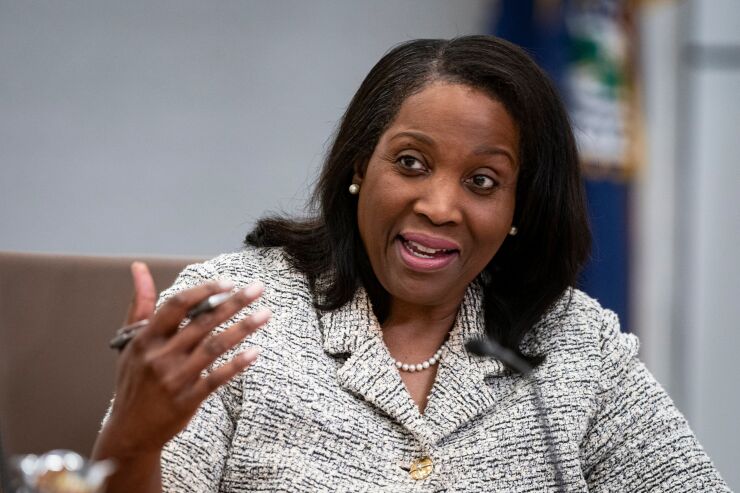
The Federal Reserve Board's leading
Fed Gov. Lisa Cook, an economist who has studied AI since 2018, discussed
"Fostering the global innovation ecosystem remains desirable through research and development, advanced education, worker training and retraining, and legal protections for intellectual property," she said. "Moreover, a consensus needs to be forged on the benefits and costs of regulation of the use of AI in the areas of privacy, compensation for training data, perpetuation and amplification of bias, and fraud."
This was the third time Cook has delivered prepared remarks about AI since joining the Fed's board of governors in 2022. Last week, she gave a speech at Ohio State University about the technology's impact on the labor market, and in September 2023 called for greater transparency in AI software. She has also addressed the topic several times during
During her speech and in a subsequent conversation with Atlanta Fed President Raphael Bostic on Tuesday, Cook struck an optimistic tone about the potential impacts of AI. She said the technology could be disinflationary by increasing economic productivity over the long run and even result in higher wage growth.
Contrary to the fear that AI — particularly generative AI, which can create unique content based on human-provided prompts — might replace workers, Cook sees the technology overtaking specific tasks but not entire occupations. She did nevertheless cite examples of AI being used to fill in gaps for underpopulated professions, such as welding. She added that AI has made it easier and more cost-effective for new businesses to be launched and operated.
Taken together, she said, these developments have improved the overall sentiment toward AI during the past year as concerns about wholesale substitution of workers have subsided.
"The fear that I heard … I'm not going to say it's gone away completely, but I think that there is a calmer approach to thinking about which tasks we're going to need to train and retrain workers for rather than this dire, stark dichotomy between occupations and AI," she said.
Cook also said AI and technology more broadly could be used to augment certain sectors — such as manufacturing — in ways that make them more appealing to Gen Z and other upcoming generations of workers.
"What they are finding, in the auto industry at least, is that having some technology, interfacing with some technology, is what gets [younger generations] interested in manufacturing," she said. "A lot of the jobs could be roboticized and the ones that really require human talent are the ones they're interested in and there's some sort of interface that they're accustomed to. So there are ways to adapt these jobs and make them more palatable, more interesting to the youngest generations."
Cook also reiterated the importance of training AI software properly. She said doing so requires input from a diverse set of users, to limit embedded biases. In particular, she noted that the generative AI chatbot ChatGPT is primarily learning from male users, citing a study out of Denmark that showed men out-adopting the program over women by 20% — bucking the trend from the 1980s of women being earlier adopters of new technology.
Cook said this speaks to her long-running concern about inclusion in the fields of science, technology, engineering and mathematics. But addressing these disparities falls on the private sector, she said.
"Ultimately, it's the employers that have the most say about this," she said. "But, I think there are opportunities to make sure it's more widespread."






